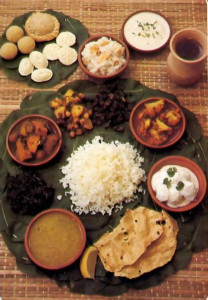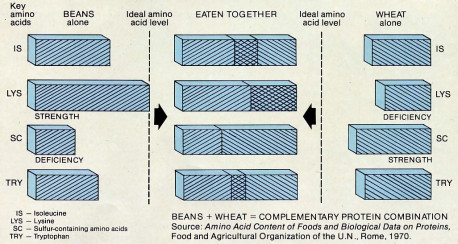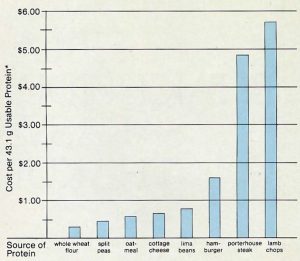Good nutrition, a balanced budget,
and a clean conscience are only the beginning …
by Rupanuga Dasa
Rupanuga Dasa is a chaplain at the University of Maryland and director of Iskcon’s affairs in the Washington D.C. area.

When Lord Krsna speaks in the Bhagavad-gita, He clarifies the ultimate purpose of vegetarianism: “If one offers Me with love and devotion a leaf, a flower, fruit, or water, I will accept it.” (Bg. 9.26) In itself, vegetarianism basically means nonviolence, protecting the animals—but offering vegetarian foods to Krsna and later accepting them as his mercy (prasada) means a lot more: bhakti-yoga, or becoming conscious of the Supreme Personality of Godhead. When combined with the chanting of the Supreme Lord’s holy names—Hare Krsna, Hare Krsna, Krsna Krsna. Hare Hare/ Hare Rama, Hare Rama. Rama Rama, Hare Hare—strict vegetarianism becomes more than a mere ethical principle or rational, humane way of life; it becomes the simplest, most pleasant means in the world for spiritual realization.
Krsna consciousness, the spiritual reason for vegetarianism, includes all the other reasons—ethical, aesthetic, nutritional, economic, medical—in the same way that a five-hundred-dollar bill includes all the potencies of a hundred-dollar bill or a twenty-dollar bill or a ten- or five- or one-dollar bill. Only the freshest most succulent, most nutritious, and most aesthetically pleasing kinds of foods are prepared and offered to Krsna. Still, because we are scientifically minded, we should carefully analyze the many advantages of eating Krsna prasada—of being a strict, spiritually-minded vegetarian. We will also examine some of the more important objections to vegetarianism. We can define a “strict vegetarian” as someone who totally abstains from meat, fish, and eggs. Some vegetarians, called “vegans,” abstain not only from meat but also from milk, because they fear pesticides and cholesterol. However, fruits, grains, and vegetables contain no cholesterol, so a vegetarian could drink a quart of milk and eat a few ounces of cheese every day without topping the maximum recommended allowance of cholesterol. Without taking milk, one is doomed to consume piles of algae, seaweed, sesame seeds, or pills to obtain essential vitamin B-12 and calcium. As for pesticides, practically everything we eat has some, because of widespread use of chemical fertilizers. The so-called ovo-vegetarians cannot be accepted as strict vegetarians, because they eat eggs, which are, after all, simply calcium-covered flesh, artificially mass-produced under conditions not justifiable in view of the numerous other sources of protein. But the term lacto (milk-drinking) vegetarian is acceptable. Taking milk of cows that may later be slaughtered does not in any way condone cow-killing, and if we had the opportunity, we would close the slaughterhouses immediately.
Objections by Nonvegetarians
One of the strongest objections nonvegetarians raise against vegetarianism is that vegetarians still have to kill plants, and that this is also violence. But it is nonsensical to equate fully sentient animals like cows with lowly vegetables. Besides, we really have to eat plants, fruits, grains, and so on, because the “vitamins and minerals found only in these vegetarian foods are essential to keep body and soul together. Certainly, plants are as alive as cows; modern experiments prove that plants have feelings, ** (Peter Tompkins and Christopher Bird, The Secret Life of Plants (New York: Avon Books, 1974), p. 86.) and the Bhagavad-gita, the essence of all Vedic teachings, confirms that all life forms contain spirit souls qualitatively equal to one another. But still, we have to eat something, and the Vedas also say, jivo jivasya jivanam: one living entity is food for another in the struggle for existence. So from a humane standpoint, the problem in choosing a diet is not how to avoid killing altogether—an impossible proposal—but how to cause the least suffering while meeting the nutritional needs of the body. A well-balanced diet of fruits, grains, vegetables, and milk products meets these criteria, and this diet is recommended in such scriptures as the Bhagavad-gita as most truly human.
Another common objection to vegetarianism is, “Jesus Christ ate meat, so why shouldn’t we?” But vegetarian Christians point out that the ancient Greek, from which the New Testament was translated, does not support the contention that Christ ate meat. ** (Rev. V.A. Homes-Gore, Was the Master a Vegetarian? (London: The British Vegetarian Society), p. 8.) For example, Greek words like brosimos, prosphagion, and trophe, all of which mean simply “food, or “nourishment,” were loosely translated as “meat. (except in the New English Bible). And, vegetarian Christians assert, where the Bible states that Christ was offered fish and a honeycomb and accepted “it (singular), it means the honeycomb. In the Old Testament a verse predicts this of the youthful Christ: “He shall eat butter and honey, that he may know to refuse the evil and to choose the good.” (Isaiah 7:15) The purport would seem to be that to behave otherwise would lead to a brutish mentality, which cannot be accepted in the character of Christ.
When we look for the reasons behind widespread meat-eating, we find that many people have been conditioned to it from childhood (“Finish your plate, dear; there are people starving in India.), and they feel guilty if they don’t indulge. In addition, myths about the necessity of flesh-eating persist, even in the face of volumes of scientific evidence to the contrary. Even the National Live Stock and Meat Board admits that a vegetarian diet can provide adequate nutrition. ** (Meat and Vegetarian Concept, National Live Stock and Meat Board (Chicago, 1977). p. 19.)
Protein Percentages Compared

Meat-eaters argue, “But meat is a perfect, complete protein, while I’d have to spend hours purchasing, cooking, and combining the right vegetables to get enough protein every day.”
First of all, meat is not “pure” or “perfect” protein, but at best 25-30% protein. Its net protein utilization (NPU, the amount actually digested and absorbed by the body) is 67%, compared to 82% for milk, 70% for cheese, 67% for mung beans, and 60% for whole wheat. ** (Francis Moore Lappe, Diet for a Small Planet (New York: Ballantine Books, 1975), pp. 96-117.) By weight the above foodstuffs may have less protein than meat, but because their NPU is high, simply by eating more of them or combining them one can easily meet one’s protein RDA (minimum recommended daily allowance). For example, milk is only 4 to 5% protein, but two cups give about 40% of the average usable protein RDA of 43.1 grams. A two-inch cube of cheese yields about 30%. And the objection that vegetarianism is too time-consuming is ridiculous. Complementarity, the right combination of foods, is as common-sense and natural as bread and butter, and it easily avoids dietary deficiencies. Furthermore, complementarity increases the food value of the combined foods (see chart below). For example, the NPU of rice alone (60%) and beans alone (40%) increases by 43% when they are eaten together, and pairing milk with whole-wheat bread increases their combined NPU by 13%.
Besides, protein isn’t everything. Essential nutrients like iron, potassium, magnesium, and calcium, as well as essential vitamins like C, A, riboflavin, niacin, and the B complex, are almost entirely absent in flesh foods. So vegetarian foods are absolutely necessary to maintain good health. What, then, is the reason for killing animals for food (besides habit, or a cultivated blood-lust), especially in American and European countries, which are rich in vegetarian foodstuffs? Even if some few insist upon eating cow carcasses, they need only wait for the animals to die naturally. Connoisseurs, who might object that such flesh would be too tough, should remember that slaughtered cow carcasses are far from fresh, since they are aged up to two weeks to dissipate and soften rigor mortis. Such purely aesthetic reasoning often produces vegetarians.
Many people are vegetarians for ethical reasons, believing that it is not at all possible to condone as “man’s dominion” the slaughter of four billion animals each year. ** (Agricultural Statistics, United States Dept. of Agriculture (Washington, D.C.: U.S. Govt. Printing Off., 1976), pp. 354, 405.) Many others would no doubt take up vegetarianism if they visited a slaughterhouse, or if they themselves had to kill the animals they ate. Euphemisms like “sirloin,” “brisket,” or “cutlets” would then no longer hide the horror of cow butchery, and the visiting shoppers would no longer agree to put the limbs or innards of cow bodies into their mouths. Such visits should be compulsory for all meat-eaters. Some may think, “So what? Who will punish me? The government makes no arrests for cow-killing.” But they are mistaken: they will be punished, as we shall now see.
Instant Karma, Insane Waste

The meat-rich American diet has been scientifically proven to cause disease. A few examples: Researchers have found that frying meat produces carcinogens, cancer-causing agents. ** (Alex Hershaft, “Hazards in Meat? Here’s Why,” The Washington Star (June 1, 1978), p. A10.) The breast milk of nonvegetarian women contains ten times as much pesticide as that of vegetarians. Many Americans, especially among the more well-to-do, eat almost twice as much protein as they need, and this often tends to leach calcium out of the bones into the bloodstream. This process can produce bone loss and brittleness around the age of forty. Evidence linking the American diet with cancer and other diseases prompted the U.S. Senate to call for an increase in vegetarian foodstuffs in the national diet. ** (“Diet Related to Killer Diseases,” Dietary Goals for the United States, the U.S. Select Committee on Nutrition and Human Needs (Washington, D.C.: U.S. Govt. Printing Off., Feb. 1977), p. 13.) Sodium nitrate, hormones, and antibiotics, given to animals in huge amounts to fatten and calm them, are passed on to the consumer and are thought by many researchers to be prime causes of disease.
Yet all these factors are not the original causes of disease, but are themselves manifestations of subtler causes—violations of the laws of nature. Humans are meant to eat vegetarian foods, but when their uncontrollable appetites drive them to eat flesh, they must suffer karmic reactions, which are shared equally by all those who participate in the slaughter—from cattlemen to butchers to shoppers to cooks to consumers. This is the real connection between diet and disease: instant karma! It may manifest immediately, as in the case of botulism, an often deadly poisoning, or later on, as in the case of bone loss; it may strike individually, as in the personal hell of cancer, or collectively, as in the mass slaughterhouse of the Bubonic Plague. But in any case, there is no escaping karmic reactions. We reap what we sow, in this life and the next, for nature has her justice above the state’s.
The Bhagavad-gita reveals how strict vegetarianism, when integrated with bhakti yoga, can counteract karma: “Devotees are freed from karmic reactions because they first offer their food to the Lord, whereas others, who prepare food only for their personal sense gratification, eat only sin.” (Bg. 3.13) In other words, anyone who dovetails his eating with the principles of bhakti-yoga becomes transcendental to all karmic reactions, while one who neglects to do so incurs bad karma. Moreover, one who acts without karma can dovetail his consciousness with God’s and become aware of His personal presence at every step. This is the true benefit of prasada.
Economically, the nonvegetarian diet has produced a tragedy. From 1950 to 1970, the grain output in the U.S. increased 50%. ** (F. M. Lappe, op. cit., p. 8.) But how was the grain distributed? Presently, livestock are given 85% of the edible corn, barley, oats, sorghum, and unexported soybeans produced in the U.S. In addition, Americans feed almost half as much wheat to animals as they eat themselves. A large portion of the U.S. continental land surface is used for the grazing of beef cattle—valuable land that might be used to cultivate grain. Most people would agree that wasting food is a sin, yet all this effort and energy produces only about one pound of meat protein for sixteen pounds of grain; the waste alone could cover 90% of the yearly protein deficit of the entire world.
On the other hand, for every pound of grain a cow eats, she produces one pint of milk, from which wholesome cheese, butter, and yogurt can be made. These foods will supply all essential nutrients for the human diet when intelligently combined with grains, fruits, and vegetables. There are at least forty kinds of vegetables, nine kinds of grains, twenty kinds of fruit, twenty kinds of beans and peas, and twelve kinds of nuts available in the market, in addition to the cow’s contribution. What, then, is the need for all the violence and disobedience to the higher laws of humankind, nature, and God? Let us chant Hare Krsna, live as strict vegetarians, and be happy in this life and the next!

Leave a Reply